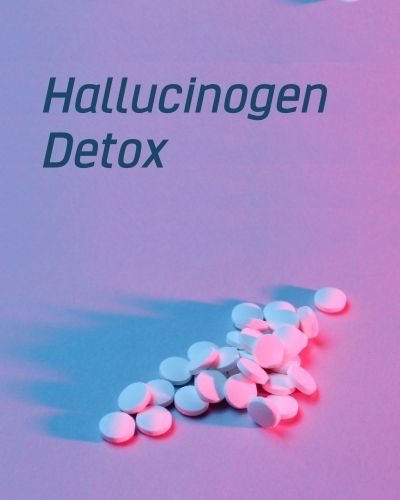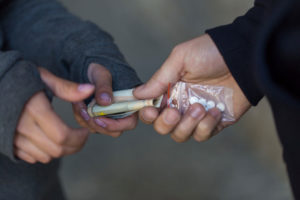What is Phencyclidine?
Phencyclidine (PCP), commonly known as angel dust, is a hallucinogenic substance that affects the brain in different ways. It was developed in the 1950s as an intravenous anesthetic, but its use for humans was discontinued because it caused people to become delusional, agitated, and irrational. Today individuals abuse phencyclidine because of the mind-altering, hallucinogenic effects it produces. PCP is also known as a dissociative drug. This is because it causes the user to feel separated from your body and surroundings.
According to the National Center for Biotechnology Information (NCBI) [1], phencyclidine was formerly used as an anesthetic and animal tranquilizer; hence it has street eponyms such as “horse tranquilizer,” hog,” and “elephant”. It was valued for its ability to provide anesthesia and analgesia without triggering cardiorespiratory depression but was soon recalled when patients experienced psychosis, agitation, and dysphoria post-operatively.
PCP is available as a white crystalline powder (“angel dust”), tablet (“PeaCe Pill”), crystals, and liquid (“whack”); with these varied forms, it can be snorted, smoked, ingested or injected intravenously or subcutaneously. Over 50% of adult patients present with the classic toxidrome of PCP intoxication: violent behavior, nystagmus, tachycardia, hypertension, anesthesia, and analgesia


Get Your Life Back
Find Hope & Recovery. Get Safe Comfortable Detox, Addiction Rehab & Mental Health Dual Diagnosis High-Quality Care at the We Level Up Treatment Centers Network.
Hotline (877) 378-4154Street Terms for Phencyclidine
- Angel dust
- Animal tranquilizer
- Embalming fluid
- Ozone
- Rocket fuel
- Wack
Phencyclidine Addiction
People who use phencyclidine can get psychologically addicted to it. This means the user’s mind is dependent on phencyclidine. They cannot control their use, and they need PCP to get through daily life. Addiction can lead to tolerance. Tolerance means you need more and more phencyclidine to get the same high. If you try to stop using, you may have reactions. These are called phencyclidine withdrawal symptoms and may include anxiety, feeling stirred up, excited, tense, confused, or irritable. Withdrawal symptoms include muscle breakdown or twitching, weight loss, increased body temperature, or seizures.
According to the US Food and Drugs Administration (FDA) [2], PCP is illegal. PCP is a Schedule II substance under the Controlled Substances Act. Schedule II drugs, which include cocaine and methamphetamine, have a high potential for abuse. Abuse of these drugs may lead to severe psychological or physical dependence.
Individuals of all ages use PCP. According to DEA [3], An estimated 6 million US residents aged 12 and older used PCP at least once in their lifetime. The report also revealed that many teenagers and young adults use PCP, around 225,000 individuals aged 12 to 17 and 777,000 individuals aged 18 to 25 used the drug at least once.
Get Help. Get Better. Get Your Life Back.
Searching for Accredited Drug & Alcohol Rehab Centers Near You? Or Mental Health Support?
Even if you have failed previously, relapsed, or are in a difficult crisis, we stand ready to support you. Our trusted behavioral health specialists will not give up on you. Call us when you feel ready or want someone to speak to about therapy alternatives to change your life. Even if we cannot assist you, we will lead you wherever you can get support. There is no obligation. Call our hotline today.
FREE Addiction Hotline – Call 24/7Symptoms of Phencyclidine Addiction
Common symptoms of phencyclidine addiction are:
- Delusions
- Confusion
- Hallucinations
- Euphoria
- Exaggerated strength
- Increased heart rate
- Numbness
- Increased blood pressure
- Feelings of detachment
- Rapid respiration rate
- Memory loss
- Physical and psychological distress
- Anxiety
- Paranoia
- Seizures
- Chills
- Muscle cramps
- Vomiting
- Death
- Rhabdomyolysis
- Dehydration
- Loss of coordination
- Disorientation
- Extreme fear or panic
- Invulnerability
- Aggression
Signs of Phencyclidine Drug Addiction
For that actively using phencyclidine, signs of dependence may include:
- An increased need for frequency or amount of PCP to achieve the desired effect.
- Unsuccessful attempts to decrease or eliminate use.
- Inability to maintain daily life expectations such as a job or family obligations.
- Using PCP in situations that are hazardous, like driving.
- Development of tolerance (needing more and more to induce the same effects).
Acute Phencyclidine Intoxication
Phencyclidine or PCP is a dissociative anesthetic agent with a reputation as an abusive substance. Nevertheless, various members of several subcultures are frequent users of this drug. It is well known in California’s psychedelia, along the East Coast, and in the Midwest’s middle- and working-class suburbs.
According to the National Center for Biotechnology Information (NCBI) [4], there were reports that individuals intoxicated with PCP have murdered their children and have even jumped out of high-rise apartment buildings. States of psychosis lasting for days can follow a brief encounter with PCP. Accidental administration of narcotics and barbiturates to people with acute phencyclidine intoxication can lead to a crisis that could prove to be fatal.
Phencyclidine continues to be found in PCP-laced marijuana cigarettes (“whacko tobacco”) and has been detected in up to 24% of street marijuana samples. Unfortunately, exposure to the smoke and butts of these cigarettes has resulted in many occult pediatric PCP intoxication cases.
Phencyclidine is available as a white crystalline powder (“angel dust”), tablet (“PeaCe Pill”), crystals, and liquid (“whack”); with these varied forms, it can be snorted, smoked, ingested or injected intravenously or subcutaneously. Over 50% of adult patients present with phencyclidine intoxication: violent behavior, nystagmus, tachycardia, hypertension, anesthesia, and analgesia.
First-class Facilities & Amenities
World-class High-Quality Addiction & Mental Health Rehabilitation Treatment
Rehab Centers TourRenowned Addiction Centers. Serene Private Facilities. Inpatient rehab programs vary.
Addiction Helpline (877) 378-4154Proven recovery success experience, backed by a Team w/ History of:
15+
Years of Unified Experience
100s
5-Star Reviews Across Our Centers
10K
Recovery Success Stories Across Our Network
- Low Patient to Therapist Ratio
- Onsite Medical Detox Center
- Comprehensive Dual-Diagnosis Treatment
- Complimentary Family & Alumni Programs
- Coaching, Recovery & Personal Development Events
Effects of Phencyclidine Addiction
The effects of long-term Phencyclidine addiction and abuse affect nearly every aspect of an individual’s life.
Some of the effects of Phencyclidine use and abuse include:
- Feeling numb
- Lack of coordination
- Darting eye movements
- Auditory hallucinations
- Feeling invincible
- Feeling of no pain
- Willingness to harm self
- Lacks rational judgement
- Memory loss
- Anxiety
- Sense of impending doom
- Paranoia
- Extreme violence
- Intense aggression
- Psychosis
- Brain damage
- Suicidal thoughts
Phencyclidine addiction and abuse commonly occur with a number of different disorders.
These co-occurring disorders include:

Phencyclidine’s Effects on the Brain
According to the National Institute of Health (NIH) [5], phencyclidine is a mind-altering substance. This means it acts on the brain (central nervous system) and changes the user’s mood, behavior, and the way they relate to people. Scientists think it blocks the normal actions of certain brain chemicals.
Phencyclidine is in a class of drugs called hallucinogens. These are drugs that cause hallucinations. These are things that you hear, see, or feel while awake that appear to be real, but instead have been created by the mind.
Using Phencyclidine may make the users feel:
- They are floating and disconnected from reality.
- Joy (euphoria, or “rush”) and less inhibition, similar to being drunk on alcohol.
- The user’s sense of thinking is extremely clear, and that they have superhuman strength and aren’t afraid of anything.
How fast a person feels the effects of Phencyclidine depends on how they use it:
- Shooting up. Through a vein, PCP’s effects start within 2 to 5 minutes.
- Smoked. The effects begin within 2 to 5 minutes, peaking at 15 to 30 minutes.
- Swallowed. In pill form or mixed with food or drinks, phencyclidine’s effects usually start within 30 minutes. The effects tend to peak in about 2 to 5 hours.
Phencyclidine Drug Overdose
Phencyclidine effects can begin within five minutes after first use. After that, it can take a bit longer, but its impact will take hold within just an hour or so. While the effects may have a rapid onset, they are known to last for several hours. And, if the dose is high enough, the results can last upwards of two days. Thus, an overdose on this drug is potentially life-threatening.
Large Phencyclidine doses bring powerful dissociation along with them. These can range from mood swings to suicidal behavior or paranoia to outright insanity. Not only does the person no longer act like themselves, but they no longer have a concept of self.
Symptoms of Phencyclidine Overdose
- Agitation (overly excited, violent behavior)
- Altered state of consciousness
- Catatonic trance (the person does not talk, move, or react)
- Coma
- Convulsions
- Hallucinations
- High blood pressure
- Side-to-side eye movements
- Psychosis (loss of contact with reality)
- Uncontrolled movement
- Lack of coordination
World-class, Accredited, 5-Star Reviewed, Effective Addiction & Mental Health Programs. Complete Behavioral Health Inpatient Rehab, Detox plus Co-occuring Disorders Therapy.
CALL (877) 378-4154End the Addiction Pain. End the Emotional Rollercoaster. Get Your Life Back. Start Drug, Alcohol & Dual Diagnosis Mental Health Treatment Now. Get Free No-obligation Guidance by Substance Abuse Specialists Who Understand Addiction & Mental Health Recovery & Know How to Help.
Phencyclidine Addiction Treatment
Individuals who have built up a tolerance to phencyclidine (meaning they need to take higher doses of the drug in order to feel the same desired effects) or experience intense cravings when they try to stop using may benefit from professional drug rehabilitation.
Phencyclidine addiction rehab is typically conducted in 4 phases:
- A client intake and assessment, in which medical staff screen the individual for the severity of their phencyclidine abuse plus other factors such as any mental health challenges and medical conditions that may need to be addressed in addition to the phencyclidine use.
- A detoxification period begins after all drug use has stopped. During this period, medical staff monitor clients for withdrawal symptoms or other complications, changing the treatment approach and administering medications as needed.
- The addiction treatment phase consists of therapeutic methods specific to the client’s needs. This period generally lasts for 30 days and includes individual therapy and counseling, group therapy, and other methods depending on the treatment facility. Clients learn the skills needed to manage cravings, identify triggers for their drug use, and form positive coping skills.
- An aftercare program is then developed to help the client prevent relapse and re-integrate into their daily life without falling back on the crutch of drug abuse. Aftercare can be a life-long process and often includes regular follow-ups with a drug counselor and participation in a 12-step program like Narcotics Anonymous.
Find the Right Treatment Plan at We Level Up NJ
The inpatient treatment approach works best as it aims to change the person’s behaviors. Also, help them establish social support systems and better methods of coping with stress. A person will likely experience many different side effects from their drug use. These side effects may be emotional, physical, or mental. For example, someone in withdrawal will likely experience many uncomfortable feelings and negative thoughts about life during the process of detox. Unfortunately for those with dependency, detox is an unavoidable first treatment step for Phencyclidine addiction.

Please do not try to detox on your own. The detox process can be painful and difficult without medical assistance. However, getting through the detox process is crucial for continued treatment. We Level Up NJ provide proper care with round-the-clock medical staff to medically assist your recovery through our Phencyclidine Addiction Treatment Program. So, reclaim your life, call us to speak with one of our treatment specialists. Our counselors know what you are going through and will answer any of your questions.
Experience Transformative Recovery at the We Level Up Treatment Center.
See our authentic success stories. Get inspired. Get the help you deserve.



Start a New Life
Begin with a free call to an addiction & behavioral health treatment advisor. Learn more about our dual-diagnosis programs. The We Level Up treatment center network delivers various recovery programs at each treatment facility. Call to learn more.
- Personalized Care
- Caring Accountable Staff
- World-class Amenities
- Licensed & Accredited
- Renowned w/ 5-Star Reviews
We’ll Call You
Sources:
[1] NCBI – https://www.ncbi.nlm.nih.gov/pmc/articles/PMC2859735/
[2] FDA – https://www.accessdata.fda.gov/cdrh_docs/pdf/K981019.pdf
[3] DEA – https://www.justice.gov/archive/ndic/pubs4/4440/index.htm#illegal
[4] NCBI – https://pubmed.ncbi.nlm.nih.gov/2938052/
[5] NIH – https://medlineplus.gov/ency/patientinstructions/000797.htm